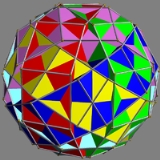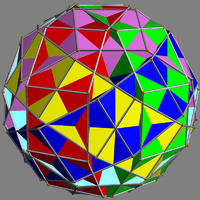
Compound of six decagonal prisms
Encyclopedia
| Compound of six decagonal prisms | |
|---|---|
 |
|
| Type | Uniform compound Uniform polyhedron compound A uniform polyhedron compound is a polyhedral compound whose constituents are identical uniform polyhedra, in an arrangement that is also uniform: the symmetry group of the compound acts transitively on the compound's vertices.The uniform polyhedron compounds were first enumerated by John Skilling... |
| Index | UC40 |
| Polyhedra | 6 decagonal prism Decagonal prism In geometry, the decagonal prism is the eighth in an infinite set of prisms, formed by ten square side faces and two regular decagon caps. With twelve faces, it is one of many nonregular dodecahedra.If faces are all regular, it is a semiregular polyhedron.... s |
| Faces | 12 decagon Decagon In geometry, a decagon is any polygon with ten sides and ten angles, and usually refers to a regular decagon, having all sides of equal length and each internal angle equal to 144°... s, 60 squares Square (geometry) In geometry, a square is a regular quadrilateral. This means that it has four equal sides and four equal angles... |
| Edges | 180 |
| Vertices | 120 |
| Symmetry group Symmetry group The symmetry group of an object is the group of all isometries under which it is invariant with composition as the operation... |
icosahedral Icosahedral symmetry A regular icosahedron has 60 rotational symmetries, and a symmetry order of 120 including transformations that combine a reflection and a rotation... (Ih) |
| Subgroup Subgroup In group theory, given a group G under a binary operation *, a subset H of G is called a subgroup of G if H also forms a group under the operation *. More precisely, H is a subgroup of G if the restriction of * to H x H is a group operation on H... restricting to one constituent |
5-fold antiprismatic Dihedral symmetry in three dimensions This article deals with three infinite sequences of point groups in three dimensions which have a symmetry group that as abstract group is a dihedral group Dihn .See also point groups in two dimensions.Chiral:... (D5d) |
This uniform polyhedron compound
Uniform polyhedron compound
A uniform polyhedron compound is a polyhedral compound whose constituents are identical uniform polyhedra, in an arrangement that is also uniform: the symmetry group of the compound acts transitively on the compound's vertices.The uniform polyhedron compounds were first enumerated by John Skilling...
is a symmetric arrangement of 6 decagonal prism
Decagonal prism
In geometry, the decagonal prism is the eighth in an infinite set of prisms, formed by ten square side faces and two regular decagon caps. With twelve faces, it is one of many nonregular dodecahedra.If faces are all regular, it is a semiregular polyhedron....
s, aligned with the axes of fivefold rotational symmetry of a dodecahedron.
Cartesian coordinates
Cartesian coordinates for the vertices of this compound are all the cyclic permutations of- (±√(τ−1/√5), ±2τ, ±√(τ/√5))
- (±(√(τ−1/√5)−τ2), ±1, ±(√(τ/√5)+τ))
- (±(√(τ−1/√5)−τ), ±τ2, ±(√(τ/√5)+1))
- (±(√(τ−1/√5)+τ), ±τ2, ±(√(τ/√5)−1))
- (±(√(τ−1/√5)+τ2), ±1, ±(√(τ/√5)−τ))
where τ = (1+√5)/2 is the golden ratio
Golden ratio
In mathematics and the arts, two quantities are in the golden ratio if the ratio of the sum of the quantities to the larger quantity is equal to the ratio of the larger quantity to the smaller one. The golden ratio is an irrational mathematical constant, approximately 1.61803398874989...
(sometimes written φ).

